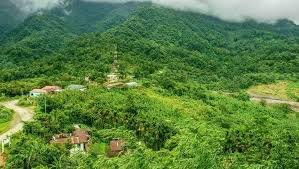Adani’s plans for what’s touted as Asia’s largest cement plant are igniting fierce opposition in Assam. The NCST has intervened, probing alleged unlawful land transfers that could displace over 14,000 tribal families and cause irreparable ecological damage in a biodiversity-rich region.
BY PC Bureau
The National Commission for Scheduled Tribes (NCST) has ramped up its scrutiny of the controversial Adani Group cement project in Assam’s Dima Hasao district. The Commission has issued a formal notice to the District Commissioner, demanding a detailed Action Taken Report (ATR) within seven days. Central to the inquiry is the contentious allocation of 9,000 bighas of tribal land in Umrangso.
The Adani Group is already facing significant protests from tribal communities in Kokrajhar, who oppose the allotment of vast tracts of forest land for a thermal power plant. These communities allege violations of tribal land safeguards under the Sixth Schedule of the Constitution.
Umrangso Project: Allegations of Consent Violation
In the case of the Umrangso plant, local residents similarly claim the land was transferred without their prior consent, directly violating constitutional protections for tribal communities under the Sixth Schedule. This latest development follows a petition from the Indigenous Peoples Party (IPP), which warned that the proposed cement plant, touted as Asia’s largest, could displace over 14,000 tribal families, including the Karbi, Dimasa, Naga, and Adivasi communities. The petition also raised alarms about potential ecological devastation in the region’s biodiversity-rich environment.
 READ: Adani Cement Project Under Fire over Tribal Land Allocation
READ: Adani Cement Project Under Fire over Tribal Land Allocation
The NCST’s escalated action comes after the district administration reportedly failed to respond to an earlier notice issued on March 7, 2024. The Commission has now issued a stern warning, indicating its readiness to invoke its constitutional powers under Article 338A, which allows it to summon officials for personal appearances if compliance is not met.
The dispute centers on a 1,200-hectare (9,000 bighas) stretch of khas land managed by the North Cachar Hills Autonomous Council (NCHAC). This land was allegedly handed over to the Adani Group without transparent procedures or adequate consultations with affected communities. Activists argue this action breaches provisions of the Sixth Schedule of the Constitution and undermines the long-standing customary rights of indigenous people over their ancestral lands.
Community Leaders Condemn “Opaque” Process
Mridul Garlosa, a leading voice against the project, has reportedly welcomed the NCST’s intervention, criticizing the “opaque” process. He specifically highlighted the alleged issuance of No Objection Certificates (NOCs) without informing villagers. Garlosa drew parallels to past land transfers to companies like NEEPCO, AMDC, Vinay Cement, and the Lower Kopili Hydro Electric Project, all of which, he claims, lacked meaningful community engagement.
Villagers from Borolokhindong, Sikilangso, Checkso, Borolobang, and Chotolobang have voiced serious concerns about potential mass displacement, loss of cultural heritage, and environmental destruction if the project proceeds.
Rajen Timung, IPP’s chief coordinator, hailed the NCST’s notice as a significant victory for indigenous rights. He referenced the IPP’s past success in Karbi Anglong, where their advocacy led the Asian Development Bank to withdraw a $434 million loan for a solar project that threatened tribal land. “This is a fight to preserve our identity and future,” Timung has been quoted by local media as saying. “We will use legal and democratic tools to hold both corporate and government actors accountable.”
The situation is further complicated by reports that the Directorate of Geology and Mining (DGM) has floated tenders for eight limestone blocks in the Umrangso area, allegedly without consulting the NCHAC. Activists suspect the Adani Group is poised to secure these tenders, accusing the Assam government of sidelining the autonomous council to accelerate industrial expansion.
 READ: Census and Suppression: Manipur Tribals Fear Repeat of Past Injustice
READ: Census and Suppression: Manipur Tribals Fear Repeat of Past Injustice
Garlosa also warned of new threats, alleging that three more cement plants, backed by Ambuja Cement, Dalmiya Cement, and another private entity, are awaiting approvals. He claimed the state government is pressuring the NCHAC to issue additional NOCs without involving the local population.
The opposition has garnered growing support from civil society groups across the region. Formal communications have been sent to organizations like the Khasi Students’ Union, as well as the Meghalaya Chief Secretary and the Principal Chief Conservator of Forests, alerting them to the unfolding crisis.
With the NCST now directly involved, both the Assam government and the Adani Group face heightened scrutiny. This conflict has reignited broader concerns over tribal land rights, environmental sustainability, and the unchecked growth of corporate influence in protected tribal areas of Northeast India.














